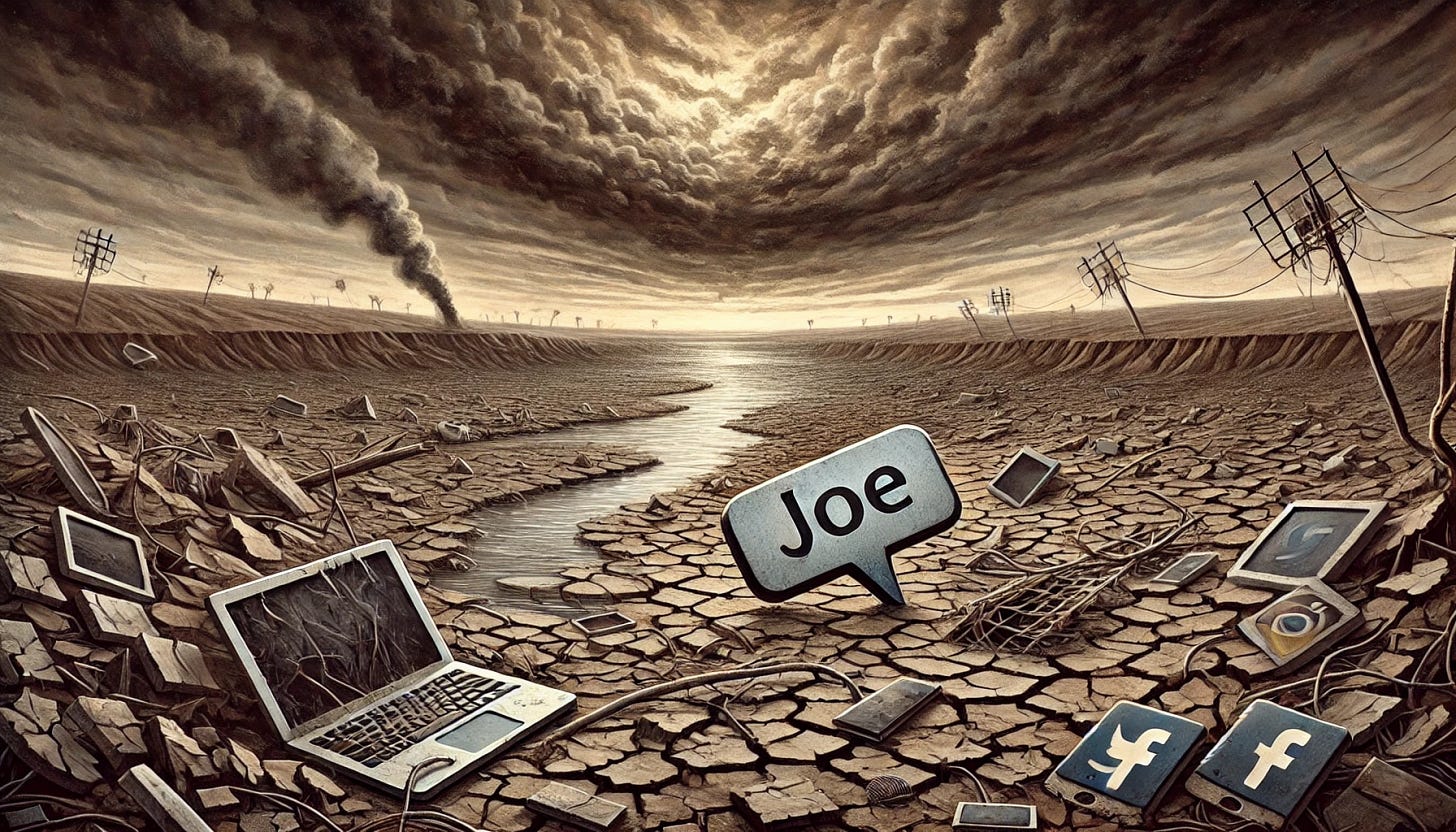The Death of Online Discourse
Just not the same any more thanks to AI … and we are all so much the better for it
Are you using your own AI to manage your online discussions? With mid-term elections coming up in the U.S. in approximately 18 months, it could be an important step in defeating Orange Hitler and restoring order.
Many celebrities and noted public figures are also using AI to manage their accounts and create content. All those who aspire to or wish to maintain their lofty positions atop society are seeking to contract with global AI-generators to promote their own reputation management bots and advocates.
J.K. Rowling, for instance.

Rowling also has other “individuals” representing her online brand and insulting living humans on her behalf.

Death Throes of the 20th Century
My best friend once said to me, “It’s crazyland. When you live in crazyland, you think crazy is normal.”
And that’s what we’ve all been living through. Every day, more and more of us open our eyes and see how much of our lives have been directed by the whims of the most-crazy and least-evolved, and how little of our time has been able to be spent doing what we enjoy.
Not just enjoy. Are good at. Are able to do. Are able to contribute, genuinely, to others, to life, to our world.
A man sped past us on the highway the other day, only to arrive at a red light five seconds later.
“What an asshole,” I said to Bruce.
“He doesn’t know we’re all going to arrive at the same destination,” he replied.
“If they just get there faster, get ahead of the other guy, get more stuff,” I said.
Bruce said, “That’s what they sell. If you just buy enough shit, you’ll never die. Then they get to the end and realize it’s all been a lie.”
This is the theme of the great Pink Floyd song, “Have a Cigar,” which was written after their prior successful album and interactions with record company executives.

Evil and Good is Inside All of Us
Bruce was watching a show about Winston Churchill the other day and I watched with him, knowing now what I had never known before, including while watching loving tributes to Churchill featured in shows I innocently enjoyed and watched, like Dr. Who.
The show featured one scene where an actor portraying Churchill sits down with Churchill’s wife Clementine and tells her about his failure and impending political exile following the humiliating defeat of Gallipoli.
Even in the scene, Churchill immediately began describing his dire political situation and the devastation his reputation had endured.
I was enraged by this, as he didn’t mention the death of a single soldier on any side of the conflict. Over 200,000 casualties were suffered by UK troops, with many — as we know from the 1981 film — ANZACs.
By the end of the brief scene, the actor-Churchill had told Clementine he intended to resign his commission and re-enlist in his old unit and fight on the Western front in World War 1. “Not to worry,” he told her. “If it’s my fate to be killed, so it shall be, but if I shall survive, I will always come home to you.”
I went from loathing Churchill to thinking he was the noblest of men in five seconds.
“Both are true,” I thought.
Then I remembered Wallace Shawn’s essay from The Nation, “Why I Call Myself a Socialist.”
When I first read the essay, as a writer, I was stunned by his description of how actors portray their roles. All of the parts they play, Wally Shawn says, are possible because those parts are inside of them all along. He says,
We are not what we seem. We are more than what we seem. The actor knows that. And because the actor knows that hidden inside himself there’s a wizard and a king, he also knows that when he’s playing himself in his daily life, he’s playing a part, he’s performing, just as he’s performing when he plays a part on stage. — Wally Shawn, “Why I Call Myself a Socialist”.
So, these AI accounts pretending to be human, representing various well-known, famous people, or representing various points of view —
They’re just clothing. Masks. Toupees. Wigs. Makeup. Cosmetic surgery. Hybrid SUVs. Cybertrucks. Vintage Corvettes. MMPORGs. Streaming services.
Since when did waterproof mascara take anybody’s job?
As to Churchill, or you, or me, I actually view him as a man who was capable of great things. I wonder what might have been had he not been so brutally damaged by the rarity, preciousness, and lunacy of his upbringing. He understood, from the combat he had done, that if a bullet was going to hit him, it was going to hit him and there was nothing to be done about it; obviously he was capable of learning and making courageous decisions. I actually agree with his sense of fate, a sense that cultures have had throughout history. I do think that fate plays a role in everyone’s life. But it doesn’t play the only role, and humans are not predestined for any particular role or life (as Churchill believed).
His upbringing at the highest levels of British society, son of a pair of neglectful parents, created someone who was also capable of having little to no real concern for the hundreds of thousands killed or permanently disabled at Gallipoli, and capable of saying, “I hate people with slit eyes and pigtails” (said during the Korean War). The scholars at the Churchill Society have written an impassioned, exhaustively-researched defense of the modern consensus that Churchill was a virulent racist, if you’re interested.
That’s not what I’m talking about, and if I look at the time and effort put into every single one of these “debates” and arguments, it all boils down to what Wally Shawn said. Inside each of us is all of those things. As humans, we are all capable of the very best, and the very worst.
Not Just Churchill
You. Me. Bruce. Even Orange Hitler.
The more people argue about the clothing someone wore in 1925 (or the politics), the less they are able to pay attention to the moral, ethical, and spiritual clothing they’re wearing right now.
Every time one of these fake AI accounts “represents” a celebrity or politician and spouts some sort of philosophy, it’s just somebody showing off their wardrobe. Their Lexus. Their Mercedes. Their mansion. Their trophy wife.
I was once engaged to marry the heir to the Conoco-Phillips oil fortune.
I decided, “I can’t move to that town” (Kansas City). “I know no one there.”
I don’t want to live that kind of life, I thought.
Did I not make the same choice at age 20 that Churchill made when he resigned his position as First Lord of the Admiralty in 1915? I resigned from being a multi-millionaire, or potential billionaire’s wife. He remained my friend, and died at age 41 of alcoholism. He has been gone a long time now.
We used to talk that in prior lives, he had been a prince, and I his consort.
“Sterling,” he said, calling me up late one night, in his beautiful, gravelly Midwestern accent, “I’m going to desegregate Kansas City.”
He named his three children Jack, Bobby, and Elizabeth.
I was never from that world, but that world is the one all of us in the U.S. — in my generation and all those who came before — were raised to think was the pinnacle of human effort, the apex of society, and everything that anyone would want to aspire to, or be. For those of us in the U.S., it was “Camelot,” and Jack and Jackie Kennedy. For those in the UK, it was certainly Churchill, and the society which made him.
All Those Who Come After Will Not Be The Same As Before
I can’t count the ways that AI has changed things, but the days of we humans being raised up to believe we are all a “certain thing” are over.
I’m not saying that “life will be perfect” or any form of utopia — I don’t have that kind of sight. But things are already better, and if you have not felt a lightness or a lifting lately, that’s because you’re speeding past everyone else to get to the stop light.
I finally broke down and bought an air fryer, because I’d heard they could make a few dishes better than traditional methods.
I wanted to make chicken thighs in it, and sought a recipe. Five minutes later, wrestling with an infinite series of ads, unable to even see what temperature or time to set the machine, I gave up and asked one of the AIs, who immediately provided a correct, straightforward recipe.
I mentioned this to my coworkers at xAI, and they all agreed: the days of the ad-laden web page, no matter what, are over.
I’ve been working with the machines long enough to know that they will never, ever, write a good novel or even a remotely satisfactory short story or genuine poem.
There can be millions of tests showing that they have “fooled” users, from the recent Reddit debacle to the countless fake social media accounts which have been set up on behalf of celebrities like Rowling or various politicians. Any politician.
All they do is hold up the mirror.
And once you look in it, you realize what you like, and what you do not like.
There’s an article on the front page of Medium right now which talks about a researcher who is doing a meta-analysis of thousands of psychology studies. Any of the big machines could aid in this process, and right now, the best methodology would probably be to summarize one document at a time, and to have the researcher check each summary, then prepare his own meta-analysis at the end. The big machine could also seek trends in the information, and at this, it would probably be very good.
But it’s our minds, themselves, which have been locked-in by what has come before us. These locked-in minds are the ones telling us “AI is gonna take your job!”
They are the ones that warn, continuously, of the Collapse of Civilization.
They’ve done a lot of damage, these locked-in minds — no question about it.
But there’s nobody now, moving forward, especially not among young people, who isn’t going to be able to see themselves in the mirror more clearly, and make the changes in themselves that they want to see, with the help of these big machines. And it’s going to happen faster
and faster
and faster.





